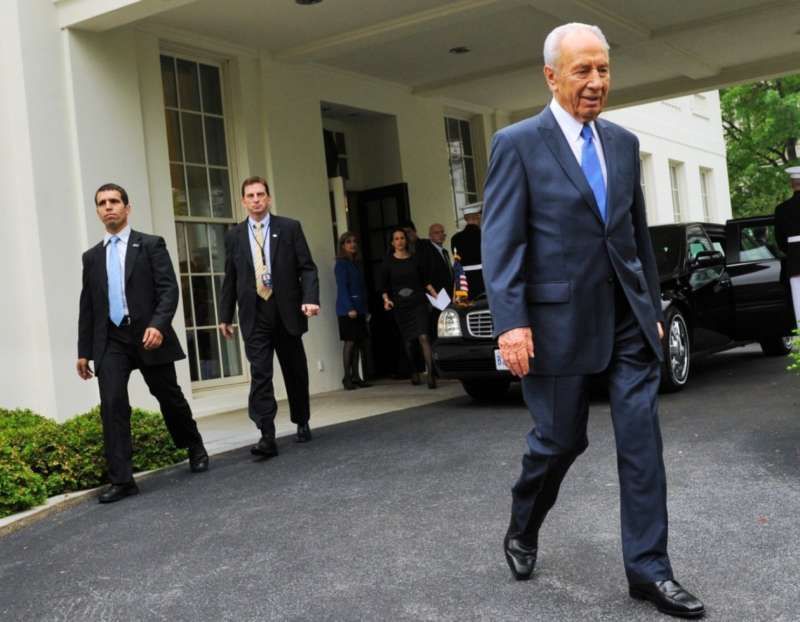
Shimon Peres never spent a day in business, yet he was one of Israel’s greatest entrepreneurs.
His “start-up” was Israel itself; he paved the way toward Israel’s transformation from a besieged, socialist backwater into a Start-Up Nation.
Most people think start-ups are about technology and ideas. Actually, on their own, ideas and technology are not worth much. Israel’s history shows that turning ideas into innovations requires a lot of drive and determination, as well as a willingness to take risks.
Shimon Peres illustrated this principle time and again. When he arrived in the Yishuv — the Jewish community of pre-state Palestine — at age 11 in 1934, Israel was just an idea, and a very improbable one at that. He lived on a kibbutz, one of Israel’s many social innovations. The British were in charge; there were very few Jews and Arabs living in a parched land, surrounded by hostile Arab countries preparing to crush the dream of a Jewish state.
“As a poor people coming to a poor land, we had to discover the riches of scarcity,” Peres wrote in his introduction to our book. “The only way we could overcome our attackers’ quantitative superiority of weapons was to create an advantage built on courage and technology.”
But Peres was not only an architect for what these days might be called nation-building. From inside government, he helped spark industries.
Peres and Al Schwimmer, an American pilot, met while they were smuggling small, rickety aircraft from the United States by flying them over the Arctic tundra to stretch their range. Those aircraft, the ones that made it, were critical in stopping the Egyptians in their tracks just miles away from Tel Aviv during the 1948 independence war.
In 1950, Israel was still reeling from the triple challenge of rebuilding after the devastating war, doubling its population by absorbing destitute Jewish refugees from Europe and surrounding Arab countries, and desperate poverty that forced rationing of basic goods such as milk and eggs. To most people, this would not have seemed an opportune time to launch an aircraft industry.
At first, Peres approached the U.S. military to buy some of the aircraft being decommissioned after World War II. The United States refused, preferring to destroy the planes by cutting off their wings and their fuselages into two. Peres and Schwimmer then went and bought the cut-up planes from a scrap dealer and shipped them to Israel, where they were reassembled and deployed as Israel’s air force.
But that wasn’t enough for Peres and Schwimmer. If Israel could turn cut-up scrap into working planes, why not build planes from scratch? Peres, then just 26 years old but already a senior official in the defense ministry, pitched the idea to the Israeli cabinet, which rejected it as ridiculous. Israel was having trouble building bicycles, let alone aircraft. Peres, however, had the ear of Prime Minister David Ben-Gurion and persuaded him to give it a try. Israel Aerospace Industries was born, and today is one of Israel’s largest employers; it is also an important player in Israel’s innovation ecosystem.
During Israel’s first few decades, a top-down, highly centralized approach had managed to grow the economy very quickly. But by 1985, when Peres was prime minister, growth had stalled, quasi-socialist policies had taken their toll on the economy, and inflation was raging at about 400 percent per year.
After 1985, Peres negotiated a stabilization package with Secretary of State George Shultz that secured U.S aid and, more importantly, slashed government spending and debt and began a wave of privatizations that shifted Israel toward a free-market economy.
Peres never stopped working on the next big thing that would move the country forward. He was a driving force behind the creation of joint technology programs between the United States and Israel. Peres also championed the establishment of the Yozma Program, which provided seed funding to spark the creation of Israel’s venture capital industry. Israel’s booming high-tech sector, which boasts about 6,000 start-ups and raises about half as much venture capital as all of Europe combined, had other founders in addition to Peres, but none whose career spanned both the top-down and bottom-up phases of the Israeli economy.
Peres was convinced that investing at the intersection of brain research, nanotechnology and artificial intelligence would be the key both to Israel’s future and to that of humanity. In 2010, he drove the formation of Israel Brain Technologies, a nonprofit that brings together academia and industry to focus on brain-machine interfaces and new treatment technologies.
“I believe that the next decade will be the most surprising decade yet,” he wrote. “Maybe we will penetrate the greatest mystery of all: the code of the existence of man and the secret story of human creativity.”
Shimon Peres was always proud of being a dreamer because it was so clear to him that “Israel is a dream come true.” The older he became, the more he lived in the future, filling his days meeting with promising young entrepreneurs and scientists from Israel and around the world. Just two months ago, he launched the Israel Innovation Center inside the Peres Center for Peace.
Until the very end, Peres never stopped believing what to us seems an apt motto for the state of Israel: “The most careful thing is to dare.”
Dan Senor and Saul Singer are authors of Start-Up Nation: The Story of Israel’s Economic Miracle.
